
Wondering if holding that meeting at work is really necessary?
Looking for time management tips to help you revaluate your approach towards meetings?
We’ve all attended meetings that are boring, long-winded, redundant, and completely unnecessary.
What’s even more unfortunate is that these types of meetings happen more often than not.
So, why is it that most meetings are a painful waste of both time and energy?
In this post, you’ll find four thoughtful reasons as to why this is the case, and how each situation may be solved.
They are poorly organized.
Holding a meeting isn’t about tilting your chair back in the conference room with your feet up on the table.
Holding a meeting is actually a lot of hard work!
There’s defining the actual goal of the meeting, the preparation of the agenda, and the careful selection of attendees.
Let’s not forget the booking of the conference room, the preparation of meeting materials, facilitating the meeting, and so on.
A meeting is many things, including planning ahead, listening to others, and making tough decisions.
There’s also carefully discussing options, analyzing information, and coming to a consensus.
If you need help preparing a meeting, make sure you prepare and follow an agenda with these items, and stick to your allotted time limit.
They are incorrectly viewed as “important work.”
A meeting is just one type of work.
It is no more important or special than planning, executing, reviewing, or revising.
You need to have all of these types of work in motion if you are going to achieve any goals or complete a project.
Likewise, you can’t magically sweep aside your responsibilities for a brief meeting and think you’ll get fantastic results.
Generally speaking, meetings should take up no more than 20% of your time at work.
The rest of your time should be spread across the other types of work as described above.
Of course, this may fluctuate if you are a manager, or if it is your responsibility to attend lots of meetings.
Always in meetings and find your work suffering on a regular basis?
You may want to decline meeting invitations and/or discuss whether or not meetings need to be held.
They are called by people who shouldn’t have the power to call a meeting.
In any given group of people, only a small number of people should have the authority, to call and hold meetings.
It’s not about being mean, unfair, or unjust; it’s plain old practicality.
Giving everyone in an office the power to call meetings doesn’t make a meeting any more or less special.
It just ends up wasting people’s time.
Overwhelmed with an incredibly large amount of meetings in your office or workplace?
Take a look at who has called those meetings to order.
What meetings are being called? By whom?
Do these people have the power to call meetings? Should they be given the power to do so?
Asking yourself hard questions like these will help you gain the answers, and solutions, you seek.
They don’t need to be held in the first place.
Sadly, most meetings are simply the result of someone’s poor judgment.
What could have been easily solved with a brief phone call or research is turned into something wasteful.
Many painful hours of repetitive information, a soapbox for someone to voice their opinion, or just a plain waste of time.
Calling a meeting should never be a default action.
If you are ever unsure as to what you should do in any given situation, stop and think for a moment.
Can you locate information elsewhere?
Can others be alerted through other methods such as email, memo, or messages?
Has information been distributed or released? Have decisions and plans been made?
If you answered, “yes,” to any of the previous statements, you probably don’t need to hold a meeting.
How about you? Which meetings are you going to reevaluate in your schedule? Join the conversation and leave a comment below!





0 Comments